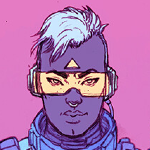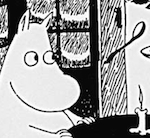|
what is your opinion on robots though?
|
|
|
|

|
| # ? May 13, 2024 21:52 |
|
My method, please do not steal: 1) Think of a good opening line. If you don't, you will lose about half of all potential agents. 2) obsess for weeks over the opening line, 3) don't write anything 4) poverty
|
|
|
|
For me the an opening line that draws people in is the easy part. It's all those words (so many words) afterwards that are my downfall. Here's my tried and true method: 1.) Get a good one-dimensional idea usually expressed in a good, yet shallow opening line. 2.) Wallow in mediocrity. 3.) Brag about how I'm an author to some non-caring fellow bar patron. Tell them how much work it is. God, so much work. People just don't realize, ya know?
|
|
|
|
heres my sure fire method to writing words 1) turn on computer/tablet/phone or take a piece(s) of paper or even a typewriter 2) open up a word app like google docs or word. if using paper, pick up a pencil or do whatever the gently caress you do with a typewriter 3) write words by hitting the keys. If using a pencil, use your hand to move the pencil to make words, or do typewriter poo poo and there you go! you figured out the trick to writing!
|
|
|
|
lol if u do not just hallucinate ur words into existence
|
|
|
|
The Saddest Rhino posted:lol if u do not just hallucinate ur words into existence A proper first draft is smeared in a noxious mixture of blood and feces on a fungus-stained cell wall or screamed again and again in a language known only to you in a feverish, high-pitched singsong cackle.
|
|
|
|
For the record, I would be interested in reading people's actual methods.
|
|
|
|
Tyrannosaurus posted:For the record, I would be interested in reading people's actual methods. step 1: Oh shoot oh darn oh gosh I've got this story in my head, only it's not really a story it's more of a premise with a loose set of feelings and images attached, dangit I'm NEVER gonna hack it as a writer in this world, gosh darnit darnit darnit all to heck step 1.5: ahahaahaha I'm going to watch star trek and play video games! no one can stop me or judge me for this because I've already deduced that I'm terrible and my writing is terrible and life is suffering! writing is just another way to pass the time before death! I never really got into anime....UNTIL NOW! that's right, creative drive, you're stuck inside an anime fan. how does it feel. step 2: hm I actually don't really like anime and passively absorbing entertainment is really depressing, oh god the hollow minutes of my life are burning up like dried leaves. What am I going to think when I'm on my deathbed??? maybe im on my deathbed RIGHT NOW and this is just one long hallucination/lamentation of a dithering, futile existence?! step 3: ok. OK. ALRIGHT YOU SISSY-rear end WORDS, YOU ARE GONNA GET WRITTEN LIKE THERE'S NO TOMORROW step 3.5: see step 1.5 step 4: ????????????? step 5: a story is there
|
|
|
|
fiction advice: write; read.
|
|
|
|
Tyrannosaurus posted:For the record, I would be interested in reading people's actual methods. First off my writing has improved a lot since I read this blog post: http://thisblogisaploy.blogspot.com/2011/06/how-i-went-from-writing-2000-words-day.html?m=1 For those who don't click it's a published author describing the three-step process to getting lots of words down: 1) know exactly what you're going to write. If you're mired in a scene then stop fighting it, get out a paper and a pencil, and brainstorm what should happen during that scene. Then follow the directions you decide on. 2) Keep track of when you're the most prolific. Observe your own habits and record your output during various times of day. Then figure out when your most prolific window of time is. Write during those times. Kill someone to do it if you must. (Don't actually do that.) (But yes do that.) 3) Be excited about what you're going to write. If it bores you then it bores your audience and it must go. If your bridging scene is lame then the audience can tell. Chuck it and make a new one. This doesn't require you to be an outliner either. You just have to apply the first step in little bursts so you can get over roadblocks quickly. If you can churn out lots of words by the seat of your pants, do that. E: personally I like outlining because it lets me play with events and develop themes so I can try to set down a unified whole. HIJK fucked around with this message at 05:56 on Sep 30, 2015 |
|
|
|
Tyrannosaurus posted:For the record, I would be interested in reading people's actual methods. if i have an idea: oh poo poo its sunday and i if i have no idea: oh poo poo its sunday and i
|
|
|
|
Tyrannosaurus posted:For the record, I would be interested in reading people's actual methods. Method two in my post is actually more or less what I do, in ideal circumstances. I have a vague structure gradually expanding in my mind, and I know the events, or bits of exposition, I have to hit, and every bit of dialogue and action I use is calculated to navigate me through those events.
|
|
|
|
Tyrannosaurus posted:For the record, I would be interested in reading people's actual methods. I start out in one of three places. Either I've got a good opening, a good concept, or a good conflict. From there, I need two things before I start writing: conflict and resolution. If I've got a conflict, great, I just need to figure out a resolution. If I've only got an opening, I've got to work that into a concept and then a conflict. Once I've got a conflict and a resolution, I know where I'm going. I take some time to track the plot points I need to hit on the way, or if it's a straightforward plot, I just jump in. I don't plan things out very carefully, but I'm very slow when actually writing, because I'm deciding on the fly how long to linger on a certain point. I like the in-the-moment control it gives me over what I'm writing, because I don't have to worry about a detailed plan, I just have to make sure the parts line up in the end. When I go back and edit, that's when I tighten up the parts that didn't work because I was spinning my wheels, or change the tone of parts where I didn't know what direction I was going in yet. I know a number of my stories have suffered because I didn't even follow my own process--there's one where I didn't decide on a good conclusion, for instance, so instead of ending, I just kind of meandered around and fell over myself at the end, despite having a solid concept and conflict up until then. Sometimes a resolution on the fly can work, sometimes it doesn't, which is why the editing pass is important. Sometimes I don't manage to get that out either, though. The above is all for short story/flash fiction stuff. With stories that have larger and longer plots, I generally plan out more, but still leave a lot of space for on the spot improvisation. My mental outline usually runs something like [waking up] [goes down to kitchen] [mom is weird] [conjoined parent chase scene] [rope ladder to backyard], et cetera. At its most detailed, it's like a loose storyboard with imagery tacked on that I want to hit along the way, and then I just fill in the rest as I go.
|
|
|
|
Tyrannosaurus posted:For the record, I would be interested in reading people's actual methods. 1. Go to Starbucks 2. Write
|
|
|
|
Tyrannosaurus posted:For the record, I would be interested in reading people's actual methods. Well, most of what I've written has been for a commission, so my (absolutely genuine) process for getting words onto the page is the "AAAAAAAAAAAARGH" method: 1. Screw around until I'm almost at the deadline and even at maximum output, I still can't meet it. 2. Turn into a gigantic stress-ball. 3. Write my rear end off 16/7 until I'm done. 4. Turn in the manuscript a little late with a huge sigh of relief. 5. Promise myself not to be such a loving moron next time. As I'm into triple-digits of manuscripts delivered over the course of my working lifetime*, and I'm still exclusively using the above process, #5 is starting to feel pretty loving hollow. It's also really, really lovely for trying to do something that someone else hasn't already paid you for. Writers who work more sanely -- about 50% of the ones I know -- almost exclusively say that they use the "JUST loving DO IT" method: Get up, barricade themselves alone with a huge coffee and a computer with no net access, and stay there until they've got 2000 words written, however long it takes. Every day that's a work day (almost all of them). Absolutely no matter what. Birthdays? Arm torn off? Meteor strike? Pfft, amateurs. Then they start the day, say hello to loved ones, become a human being, etc etc. Before that, they're Jack Torrence in the Shining. A small percentage of writers I know successfully defer the JUST loving DO IT period until later in the day because of child care, but even then, they're less productive on aggregate. Once you let the day in, there's a chance it's going to eat you up. Obviously, the people I know are a small an unrepresentative sample of the literary world. This is just my experience. * I really wish that implied anything other than poverty & obscurity. But it doesn't. Don't be impressed. EDIT: For working out what to write, I outline in progressive layers. Start with a one-sentence log-line for the piece. "It's about a guy who discovers giant robot fish eating his house, and has to kill the Buddha to stop them". "A bunch of dangerous but drunken ninja redneck farm-hicks discover love." whatever. Then expand that into three sentences, one for the start, one for the middle, one for the end. "Ted discovers giant robot fish eating his house with their horrible dracula fangs (how?)." "Ted uncovers a hideous plot by the Buddha to bring abound Robo-Icthy-Geddon." "Ted kills the Buddha in a thrilling lightsaber-versus-chaingun duel." Then expand each of them again, and again, and again, cramming in cool stuff and twists and turns and whathaveyou at each stage. Once you have enough stuff, make sure that it alternates in emotional tone for maximum reader engagement. "Ted is woken by his roof liquefying into nanobots  " "Ted escapes without getting turned into kibble " "Ted escapes without getting turned into kibble  " "Then, if I'm really pushed for time (heh!), I'll try to break each point down into summaries that should take about 100w each. I find that getting words out is much, much easier when I have good foreknowledge of where I'm going that day. No plan really survives contact with the enemy, so all the above gets regularly revised as I go, but it's how I get the words out. Ghostwoods fucked around with this message at 13:22 on Sep 30, 2015 |
|
|
|
I write in my head, basically thinking of the big plot points, then sit down and write without really knowing where i'm going. most of the themes and images i use are created as I write. i'm one of those "lets see where the characters take me."
|
|
|
|
crabrock posted:I write in my head, basically thinking of the big plot points, then sit down and write without really knowing where i'm going. most of the themes and images i use are created as I write. i'm one of those "lets see where the characters take me." Why?
|
|
|
|
Tyrannosaurus posted:For the record, I would be interested in reading people's actual methods. 1) I always start with a concept or scene or (if I'm lucky) a series of scenes. Then I mentally barf out a scene onto a note card, toss it aside and move on to the next scene. Note that the scenes come out as a stream of consciousness in this stage, and are usually way out of order. Once I have a good number to start with (5 or so for short stories, 20 or so for novels), I arrange them in the order I think they should go and create new note cards to fill in the gaps and connect the already existing note cards, effectively storyboarding my story. 2) Turn said note cards into a concise and more fluid outline. 3) Here I steal a page out of my film school days and turn the outline into a treatment, which is basically a literal, no frills present-tense telling of events. Ever read a wiki plot synopsis of a novel? It's basically that. 4) Character bios, where I really dig in and figure out who my characters are. I also cross reference them with my treatment and ensure the people they are would do the things I have them do, and revise accordingly if I see any problems. 5) WRITE! This encompasses drafts and revisions and more drafts, however many I need before I'm satisfied I have a finished product. Typically it's 2 or 3 full drafts where I focus on story, characters, and theme, and then 1 quick draft where I clean up grammar, spelling, and any small changes that need to be made. It's funny to me how structured my process has become over the years, since abandoning structure and embracing the discovery method was the only way I was actually able to finish my first draft a novel about 4 years ago (it was poo poo, but hey, it was also finished). Once I figured out how to actually write and finish a first draft, I was able to slowly reintegrate elements of outlining and structure over time.
|
|
|
|
here's a cool weekly flash-fiction competition - http://adhocfiction.com/2015/04/about/ Winning gets you a freeroll into this: http://bathflashfictionaward.com/
|
|
|
|
I can't speak for Crab, but I am also one of those writers that doesn't think too much ahead of time before diving in. Typically, my ideas come completely randomly, usually inspired by some other thing I'm doing. Most often it's music, where I will have a scene of some sort pop into my head almost like a kind of music video director. I don't really have much control over it. Just driving along one day and *boom* an idea. Sometimes these ideas are completely fresh; others I find might fit with a character or concept I've had for a while. I do feel that having decent characters is the foundation of a good story, more so than plots or themes since the characters are what the readers will relate to and keep them turning pages. I'll also have some idea of the conflict, mostly who the bad guys are and what exactly their purpose in the story is in relation to the protagonist. Once I have a general idea of the story I want to tell, I just get into Scrivener and dig right in. Sometimes I'll have a vague idea of an ending, and key moments within the book will usually come as they will. I never outline, do character drafts, or anything like that. At least, not written down, though I am usually keeping a rough map in my head as I think of things and move along. As for why? Well, there are a few reasons. Perhaps the biggest for me is that I'm strongly against placing an emphasis on technical details over entertaining ones. Words can be revised, and many of the lessons you'll learn in a Creative Writing class and so on will be useful (and important) during the editing phases of writing a novel. However, in my experience in creative fields (not just writing but photography and film, among others), I've found that the people who spend a great deal of time on making a technically correct piece of work are not so great at creating an entertaining piece of work. There is a major difference between the two. That's not to say that's always bad. Some fine examples of English literature are from authors who painstakingly thought over every word and outlined every bit of their book beforehand. If you are writing literary fiction, keeping your writing tight is essential. Also, short stories need to be thought out, as every word choice is magnified by virtue of having less space to work with. In the world of art, technicality and merit are just as important as entertainment, and sometimes even more so. If the idea of being "pop" author sounds terrible to you, then please outline, lay out your themes, and think very, very carefully about what you're putting onto those pages. But, personally? I'm not a literary fiction writer. I write fun urban fantasy books and stories. My heroes are Gaiman and Rowling. I want to write books that are entertaining, and I do not believe spending days worrying about technicalities is going to help write me somehow write a better book. It may help me edit a decent book into a good one, but storytelling is just that: writing your goddamn story. Your parents don't need an outline to tell you about how they met. Your uncle doesn't worry about "Show don't tell" when he's sharing stories of his time in the Army. People tell stories every day that are incredibly entertaining, and they don't need a stylesheet to do so. Plus, I feel many issues get ironed out on their own automatically. Ever tried to write a 70k word novel by just "telling" people about things? It's ridiculously hard. Telling is a short business. There's a difference between description and purple prose, of course, but I don't think there's a writer out there who hasn't tried to fill out a scene for word count as much as storytelling. Also, I love the organic nature of not knowing the specifics of what's going to happen. When you worry about themes and plot before you worry about what kind of story you want to tell, you end up bending your words to match the preconceived notion in your head. Often times, this results in works that are preachy, full of blatantly obvious turns, or are just plain boring to read. In personal experience, trying to write to the theme actually lead to more writer's block figuring out how to get the stories to match those themes than the times where I just sat and wrote and didn't care where the story took me. When I just sit and write and see where it goes, all kinds of fun things happen. Maybe they're entertaining to the readers (and the feedback I've received seems to suggest so!) and maybe they're not, but those stories are really fun to write. I originally wrote a character who tried to chase after a boy only for me to realize halfway through the book that she was gay. It wasn't planned. I just read what I had written and went "Well, holy poo poo." I'm a dude who hates children yet discovered I love writing them because they're both incredibly honest and wildly unpredictable. It's taken characters from being machines I created into real beings with their own thoughts and ideas. You can ask my characters any question, and I can tell you how they would respond without missing a beat. I don't think that's something I could make them do if I plotted every moment of their lives beforehand. Now, bear in mind that while this all works for me, it may not work for someone on deadlines or anything. Sometimes, you have an idea you just need to write down, and you can push through a ton in one day. With no outline, though, you'll also run into the problems of not always knowing how to continue. Someone who outlined might only need some help figuring out the specifics and small details before moving on, but it's pretty hard to come up with "How do my main characters escape this prison halfway through the book?" if you didn't think of the answer well beforehand. It can take a long time to finish a book. I never said it was the fastest way of finishing, after all. There are a few posters here that are successful, self-published romance who are able to write new material for release every couple of months at minimum to keep their Amazon market up. As a fly-by-your-pants writer, I could not do that. It took a year-and-a-half to finish the book I currently have in query. My newest project has about a chapter done after about a month. It is very slow going. Then again, I'm not a famous writer. I don't have a successful self-publishing career or fans with expectations to be met. I write because I was unemployed, needed something to keep myself from going stir-crazy, and felt the stories in my head were one of the few productive things I could do for myself between hours of filling out applications, surfing through Craigslist ads, and staring at my desktop background. It's still that way. For me, outlining and plotting and all that would feel like work when all I really want is to escape and just tell my story of a sky pirate who kidnaps a girl from Missouri over a "Lawrence of Arabia" poster that hides the location of Pandora's Box. Axel Serenity fucked around with this message at 23:16 on Sep 30, 2015 |
|
|
|
Why what? Why do I write my big plot points in my head? Because I like to just zone out and imagine scenarios and eventually I settle on one that tweaks a cliche in a way i find entertaining. Why do I let my characters run loose in the page? Because if I try to pre-plan too much it feels wooden and instead of getting to explore the neat things that came up I'm stuck. I just head towards a vague idea, and often end up abandoning it completely in favor of something i arrived at organically. My better received stories are when I go back and edit it to seem like that was my intention all along, and some of my least popular accuse me (rightfully) of not knowing where I was going with my story.
|
|
|
|
I'm kind of curious of whether anyone ever had a friend read something and just tell them it was terrible. A good friend read through the second draft of my book and said it was really good in essence, but needed to be improved in a few areas. That's fine, I love getting feedback. But I'm wondering if anyone's just been like, this is poo poo.
|
|
|
|
change my name posted:I'm kind of curious of whether anyone ever had a friend read something and just tell them it was terrible. A good friend read through the second draft of my book and said it was really good in essence, but needed to be improved in a few areas. That's fine, I love getting feedback. But I'm wondering if anyone's just been like, this is poo poo. The only reason you should feel bad about this is because it should be you that's reading it saying, "this is poo poo".
|
|
|
|
Overwined posted:The only reason you should feel bad about this is because it should be you that's reading it saying, "this is poo poo". I thought that was implied.
|
|
|
|
i dont really have a method, i like posting in threads tho
|
|
|
|
Tyrannosaurus posted:For the record, I would be interested in reading people's actual methods. To get something to edit (not elaborate editing method posted above, which as mentioned I do not do every time, because jeeeeeez): Once I've gotten through all the stupid anxiety and attempts to figure out my entire story word-for-word in my head and finally remembered that writing is just sitting at my desk with a pen or a computer and not being attacked and that I can't actually ever think of much until I do that, I just sit and write bullshit. Like, just dumb rambling stuff about what I might want to write about. Here's what I wrote when I was sketching out the Harkel story that I wrote in 2 hours for last week's thunderdome quote:Ways that Harkal can get you in trouble That one came out pretty simply/easily, and is exactly the story I wrote. If it hadn't shaken out so quickly, there's no way I could have dashed off the story in two hours. For robot apocalypse week, when I got an HM, I wrote over 10 pages of stuff like this before the idea congealed into something I could really start working on. It took that long before I came to the idea of telling the story from the perspective of the betrayer instead of the betrayed, and also making her a party girl killing over petty jealousy instead of a cunning villain or whatever. That's what created a compelling character voice that I could finally work with. For me, anyway. Sometimes I'm lucky and get the voice right away, or the first line or two. That can make it a lot quicker to figure out what happens next, but almost always I have to go through this exercise. Depending on how long the story is, I might go through this again for individual scenes. Multiple times. Writing about writing, then writing. For a novel, I go through this about a zillion times? Back and forth between writing actual scenes. I'll summarize what I've come up with that I like into an outline-like-thing (see thoughts on outlines below). I'll find conflicts or inconsistencies or just things I don't like, and I'll go back to scribbling notes to myself trying to figure out what to do, and writing out possible solutions. Sometimes these evolve into actual scenes, but... not as often as I would like. Most often, scenes start with dialogue. Especially if I'm writing romance, where nearly every plot development comes from pure character interaction. Sometimes I write multiple pages of dialogue that I know will be mostly or entirely deleted, because that's how I can get into the scene in the characters. There's nothing else -- no setting, no movement. Lots of adverbs and set bookisms. He shouted. She cried. He whispered desperately. It doesn't matter (this is why I have such a vigorous editing process!) My rough drafts of non-dialogue scenes are just as rambling and full of side-tracking nonsense and notes. I'll find an example and add it. Thoughts on Outlines: I can't deal with the formal structure of a "real" outline for novels -- at least not yet. I can see it working for me in the future, especially with romances. By "real" outline, I mean something with levels and headings like I would use for a non-fiction paper like an essay or a memo. I get way too caught up in trying to figure out how deep into a level to put what. I do like to loosely compare my story to structure examples like the Save-the-Cat beat sheet or other story-structure outlines (there are dozens, they are all basically the same: Intro/Stasis/Desire, Mini-Crisis/Decision/Commitment, Bad poo poo, Bad poo poo Gets More Intense, Promises Delivered Upon, Decision/Sacrifice-->Climax, Denouement.) Some people work really, really well with outlines. If that is you, or if you think that might be you, I highly recommend exploring the world of outlines. Dr. Kloctopussy fucked around with this message at 07:57 on Oct 1, 2015 |
|
|
|
sometimes i write to brainstorm, but not very often. my TD folder has 6 brainstorm documents. here is the type of poo poo i write when i'm thinking:quote:zoos are wheare people go to see strange animals http://writocracy.com/thunderdome/?story=1255&title=It%5C%27s+All+Happening
|
|
|
|
crabrock posted:I write in my head, basically thinking of the big plot points, then sit down and write without really knowing where i'm going. most of the themes and images i use are created as I write. i'm one of those "lets see where the characters take me." This is me too, though I tend to start by thinking of the most dumb and obvious way to do something then gradually changing the parameters until it makes me laugh, or frown or smile. E: oh hey that's what crarborkc does too he's such a copier
|
|
|
|
Tyrannosaurus posted:For the record, I would be interested in reading people's actual methods.  edit: actual advice: https://www.youtube.com/watch?v=rDjrOaoHz9s Bobby Deluxe fucked around with this message at 14:21 on Oct 1, 2015 |
|
|
|
My method: 1. Get vague idea for a setting or a character. 2. Tack on an older vague idea for a setting or a character. 3. Brood on the combined result for hours/days/weeks/months/years. 4. Scribble random notes in notebooks and type them in Scrivener files and post them on blogs and tell them to friends. 5. At some point an outline happens somewhere. 6. Write ??
|
|
|
|
Thanks to whoever posted the Joust contest months ago, since I actually got published in it. Runner-up, but it was still my first publication, which is nice. Normally I don't bother. Professional editors are crazy thorough, it was great
|
|
|
|
Oxxidation posted:Thanks to whoever posted the Joust contest months ago, since I actually got published in it. Runner-up, but it was still my first publication, which is nice. Normally I don't bother. Congratulations, man!
|
|
|
|
Oxxidation posted:winning Awesome!
|
|
|
|
Oxxidation posted:Thanks to whoever posted the Joust contest months ago, since I actually got published in it. Runner-up, but it was still my first publication, which is nice. Normally I don't bother. That's excellent, congratulations!
|
|
|
|
Oxxidation posted:Thanks to whoever posted the Joust contest months ago, since I actually got published in it. Runner-up, but it was still my first publication, which is nice. Normally I don't bother. That's great! Congratulations!
|
|
|
|
cool, good job
|
|
|
|
Oxxidation posted:Thanks to whoever posted the Joust contest months ago, since I actually got published in it. Runner-up, but it was still my first publication, which is nice. Normally I don't bother. Awesome, dude! Congrats
|
|
|
|
Oxxidation posted:Thanks to whoever posted the Joust contest months ago, since I actually got published in it. Runner-up, but it was still my first publication, which is nice. Normally I don't bother. congrats dude! post the link when it's up because i like your writing
|
|
|
|
I just want to drop a general thanks to the posters in this thread. I just had my first story published in Under the Bed on fictionmagazines.com, and I'm stoked. I've absorbed a ton of advice here. I went back and read one of the first stories I wrote, and holy hell has there been progress.
|
|
|
|

|
| # ? May 13, 2024 21:52 |
|
Oxxidation posted:Thanks to whoever posted the Joust contest months ago, since I actually got published in it. Runner-up, but it was still my first publication, which is nice. Normally I don't bother. Congrats!
|
|
|






















